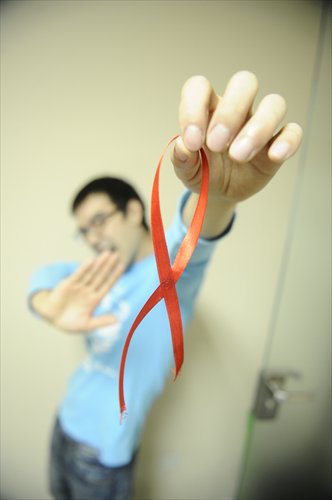

Due to discrimination and poor understanding of AIDS/HIV, some people suffer from AIDS phobia but find it hard to get professional treatment. Photo: Li Hao/GT
"I was a very outgoing guy before, but after I became embroiled in this vicious circle, I became gloomy. I couldn't make myself interested in anything, not my work, friends or family," the 26-year-old man surnamed Wu said. "Every day was tough."
Wu was talking about his experience with AIDS phobia. Not to be confused with AIDS itself, AIDS phobia is the irrational belief that one has AIDS even though medical professionals have ruled it out. It is also manifested in the belief that one is destined to catch AIDS.
One evening in May, Wu had a one-night stand with a colleague after getting drunk. Despite wearing a condom, after he woke up, he grew anxious and began to believe he had contracted AIDS/HIV.
Since then, Wu has had several tests from different hospitals, but the results all came back negative.
"I grew up in the shadow of a hospital, in a family of physicians. Since I was very young, sometimes I would hear from them that patients must do AIDS/HIV detection tests before surgery to avoid infecting the doctors," said Wu.
Irrational panic
"There are several different ways of thinking about AIDS phobia, or as it is sometimes referred to particularly in China as AIDS panic, or kongai zu. Basically these are people who are excessively anxious that they have already caught AIDS or that they might catch it so they do things which interfere with their lives like excessive demands for AIDS testing (despite repeated negative findings) or excessive avoidance of people and places where in fact that avoidance doesn't bring about any extra safety from AIDS and is irrational," Dr. Raj Persaud, a consultant psychiatrist in Harley Street, London and emeritus visiting Gresham Professor for Public Understanding of Psychiatry, told Metropolitan by e-mail.
Experts interviewed by Metropolitan all said that there were many factors behind the phenomenon of AIDS phobia, and highlighted public ignorance of the ways AIDS/HIV is transmitted. They also pointed out that the discrimination and social stigma facing AIDS patients are contributing factors.
While therapy can help remove this phobia, the dearth of professional psychologists who are familiar with both basic medicine and psychology is contributing to the problem, according to experts.
Ongoing nightmare
Despite being given a clean bill of health, Wu feels he is trapped and he cannot tell anyone.
"It is unlike hepatitis or diabetes. If you get AIDS, people will think that you must have done some dirty sexual practice, something that tarnishes your character. I would rather end my life in a car accident than let my family feel that shame," said Wu, who once thought about suicide, fearing that his imagined condition would cause humiliation for his family.
This July, Wu stumbled onto an organization called the Chengdu Fear of AIDS Intervention Center (CFAIC), in Sichuan Province. He joined a QQ group for AIDS-phobic people, which has over 1,100 members.
After several counseling sessions with Zhang Ke, psychological counselor and the head of the center over a period of more than one month, Wu's fears were gradually eased.
"As a student majoring in the sciences, I need scientific analysis and logical reasoning to persuade myself. After the analysis, I began to calm down and realized that I do not need to panic over it because I evidently had not caught AIDS/HIV," said Wu.
Raising awareness
Since it was founded in 2009 as an NGO providing psychological assistance to AIDS-phobic people, CFAIC has provided psychological assistance to over 6,000 people, according to Zhang.
"There are no statistics on the specific number [of AIDS-phobic people] in China, but it has had massive growth according to our statistics," said Zhang, adding that among all the respondents, men accounted for around 60 percent, and most were aged between 19 to 29 years old.
Copyright ©1999-2018
Chinanews.com. All rights reserved.
Reproduction in whole or in part without permission is prohibited.